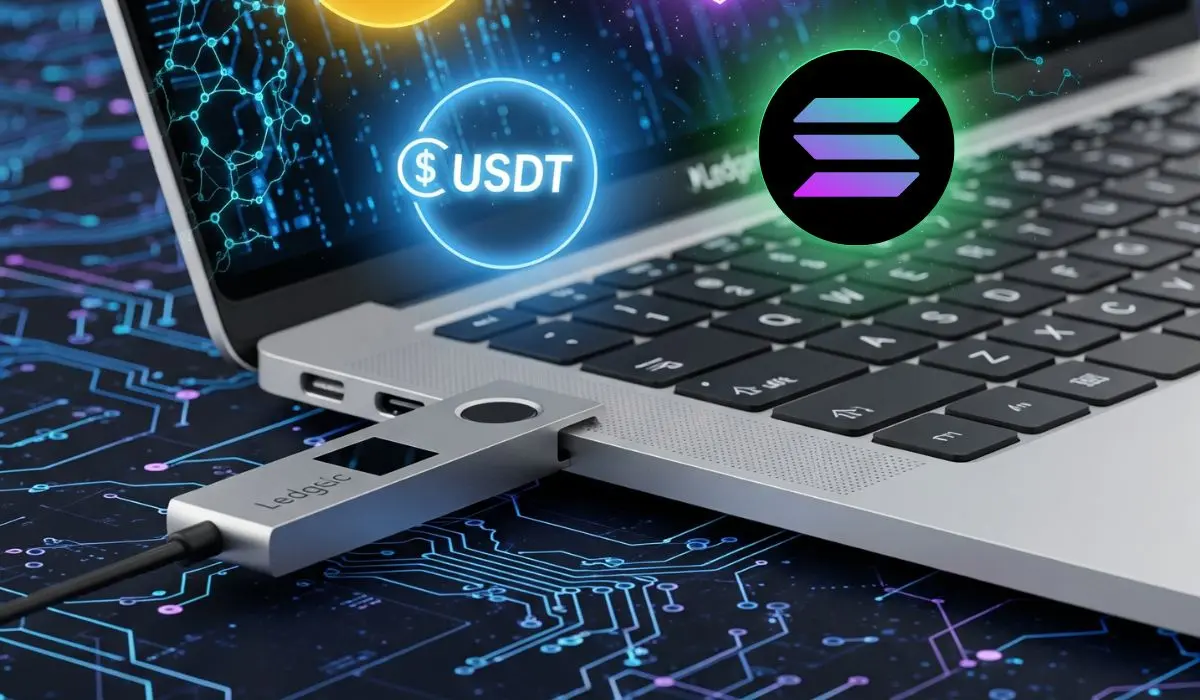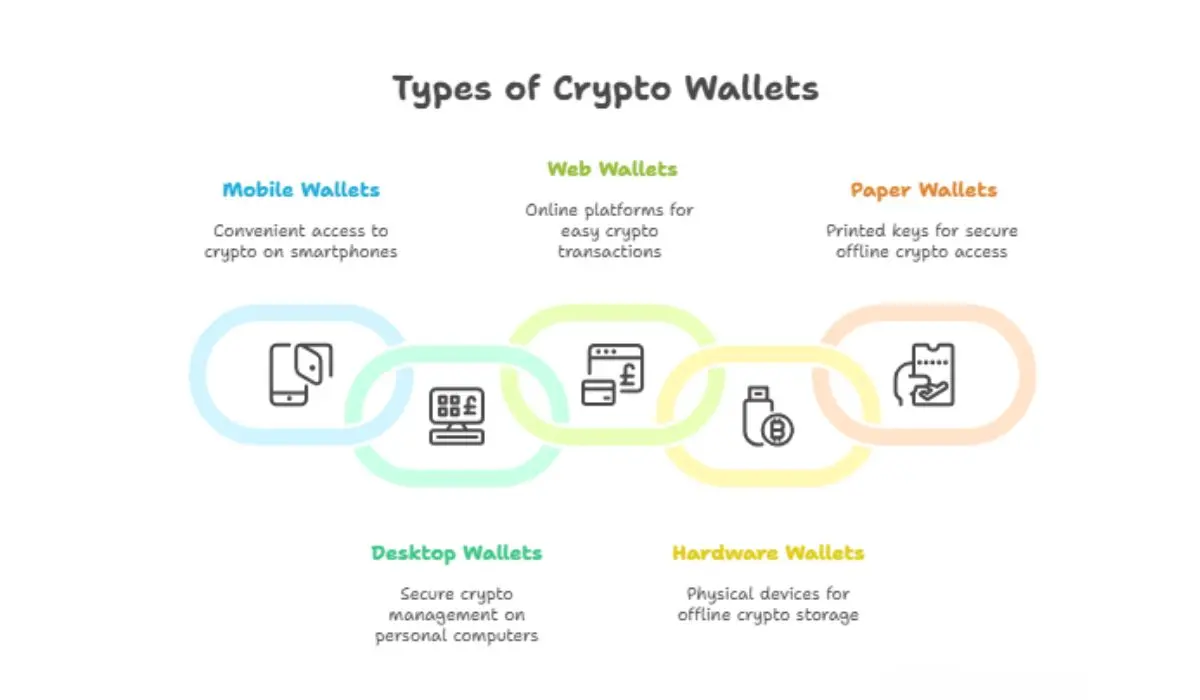The Safest Cryptocurrency Wallets in 2025

There is no escaping it – cryptocurrencies are here to stay. Whether you are a crypto-trading expert or someone just looking to start out, getting yourself a cryptocurrency wallet to store your coins is a necessary part of your journey.
Of course, for the beginners amongst us, it can be a little confusing knowing where to start, and when it comes to choosing the safest cryptocurrency wallets, making a wrong decision can cost you dearly.
That’s why in this article, we have decided to provide you with a full lowdown on all of the information that you need to know- where/how/why/what/and which cryptocurrency wallet is best for you.
In a world where online safety, privacy, and security is paramount as well as an ongoing concern, keeping your cash safe and secure against the ever-growing threat of cyber-attack is paramount.
So, without further ado, let us give you the ins and outs of cryptocurrency wallets and the options on the market and available to you.
What Is a Cryptocurrency Wallet?

If you are a real cryptocurrency beginner, then all this fancy and techy-sounding jargon could be a little confusing. In short, a cryptocurrency wallet is pretty much the same concept as a physical wallet – the only difference is that the cash it contains is digital, and you can’t put it in your pocket in the same way.
A cryptocurrency wallet is a digital wallet that keeps your digital/alternative/cryptocurrencies safe and secure. It is password-protected so only you can access it, and there are different types (which we will explore later) available depending on your needs and requirements.
From cold storage to a desktop, mobile, hardware, and software options – there is a cryptocurrency wallet to suit you.
Although we have used the word “store? to describe the function of a crypto-wallet, we’d better explain that it doesn’t store your money there.
Instead, it provides you with a private key (a secure, digital code which is only known by you and your wallet), which is stored in the wallet and shows the ownership of a public key (a public code which is connected to a certain amount of your currency of choice).
In other words, your wallet stores your private and public keys and allows you to access your funds, as well as provides a personal ledger of transactions for your information and records.
But a cryptocurrency wallet doesn’t just store? Your money is safe; it allows you to send and receive as well. Either via email, QR code, or through sharing a hash- you can transfer your cash to colleagues, friends, vendors, suppliers, or service providers- as long as they accept the cryptocurrency that you are using.
Remember that you cannot use cryptocurrencies without a wallet, so picking one that suits you should be one of the first things that you do!
What Makes a Cryptocurrency Wallet Safe?
So why should you put your trust in a digital wallet? We put our faith in banks every single day, but they tend to have a long history and are regulated by the government and various authorities. And, the whole thing with cryptocurrencies is that they are completely decentralised, and therefore it follows that wallets play to the rhythm of their song as well.
So, where does this leave yo,u and how do you know if your cryptocurrency wallet is safe?
Reputation
First up you need to make sure you are using a wallet with a good reputation. Stick to well-known brands (we will discuss this in detail below) and always try to read some reviews from others who have used the service and provided some feedback.
Make sure you read about it and fully understand how it works and what your obligations are. After all, this is your money at stake.
Wallet type
You also need to consider which type of wallet will work best for you – do you need one that you can keep on your mobile? Or is it safer for you to have an offline wallet that is only accessible via a hardware device? Based on your needs and requirements, you need to make sure you choose the most suitable option for you.
Software
Another thing to look out for is some software solutions that present themselves as wallets but actually, contain malware that is ready to infiltrate your computer and breach your security. The best way to avoid this is to avoid any software that comes from a source that you do not know or trust – in other words, stick to well-known providers and remember that if it seems too good to be true – it probably is.
Best practice
Asides from these considerations, remember that the overall security of your wallet relies on you adhering to best practices. Remember to keep only the currency you need in the wallet you use frequently and consider using Google authentication to provide you with extra layers of protection.
It is also wise to back up your crypto wallet and private keys, being sure to encrypt them. You can consider using a pen drive or a CD to do this as if you lose your wallet or keys and do not have a backup saved, you lose all of the currency connected to it.
Different Types of Cryptocurrency Wallets

As mentioned above, there are several different types of cryptocurrency wallets available depending on your needs and requirements, how much money you will be storing, what you will be using it for and of course, how much security you require.
Online Wallet
An online wallet typically refers to a wallet that you access via an internet browser. Sometimes they are referred to as online wallets, but then this terminology can get confusing when we start to consider individual platforms that your wallet can reside on, such as a desktop or even a mobile wallet.
These wallets are great as far as ease of use goes, but it would be wise not to put all of your currency in a wallet of this type because they tend to be somewhat attractive to hackers. That said, they are the quickest way to complete transactions, can handle multiple currencies, and can be used with the TOR network for optimum privacy.
Perfect for those who want to store small amounts of currency for quick online transactions, not so great for keeping all of your eggs in one basket.
Mobile Wallet
A mobile wallet does precisely what it says on the tin – it is stored on your mobile or tablet in the form of an application, and it provides instant access to your cryptocurrencies wherever you are, as long as you have your mobile device with you.
The beauty of a mobile wallet is that it can offer the user additional features that far surpass internet-based wallets. However, they do come with a few minus points as well.
While they are practical and convenient, and great for issuing and receiving payments at any time, you must remember that mobile phones are rather insecure devices. If you lose your phone, someone gains access to your device, or your mobile is maliciously compromised in any way, you can lose access to your wallet and your funds in the blink of an eye.
Desktop Wallet
One of the more secure options available, especially when compared to an online or mobile wallet, a desktop wallet is a popular choice.
There are several options when it comes to using a desktop wallet – you could opt to use your desktop wallet on a PC that is connected to the internet, or you could choose to use it on a device that is not connected, therefore as a sort of cold storage device.
The decision should be taken carefully, and based somewhat on your dedication to keeping on top of your antivirus and online security precautions. Much in the same way that we often have a spare mobile phone floating around, having an additional laptop and using it for this purpose could be a great solution.
Hardware Wallet
While a hardware wallet is a little less user-friendly than a web or desktop wallet, they are much easier to get the hang of than a paper wallet, and it are often far more secure than a hot or online wallet.
A hardware wallet comes in the form of a small device, similar to a USB drive, and it often has a screen. They are great and secure options for storing large amounts of currency, such as savings or investments, and they offer you optimum control over your money.
The advantages are that a hardware wallet offers the best options for storing currency safely and securely, and the disadvantages are that they can be a bit tough to get to grips with for beginners, and they can sometimes be difficult to find, as they tend to sell out pretty sharpish.
Paper Wallet
Before the days of hardware wallets, paper wallets were the only way of cold-storing your cryptocurrencies. Hashes or keys are printed out on paper, and it is then your responsibility to keep that paper safe, as should you lose it, your currency is gone forever.
While this type of wallet is immune to hackers, it is tough to move currencies around, and of course, if you spill water on your bit of paper, there is no getting it back!
Also Read: Hardware vs Software vs Paper Cryptocurrency Wallet
Top 10 Blockchain Wallets in 2025
Choosing a blockchain wallet in 2025 comes down to your priorities—whether that’s maximum security, easy access to DeFi, or support for thousands of assets. Hardware wallets still dominate for cold storage, while hot wallets have grown into full Web3 dashboards. Below, we review ten of the best options available this year, highlighting their type, security features, and ease of use so you can make an informed choice.
Ledger Nano X
Ledger Nano X is a hardware wallet built for users who want the strongest protection for their crypto. It supports over 5,500 coins and NFTs and connects via USB or Bluetooth. Security is handled by a certified Secure Element chip and PIN-based access, while recovery is managed through a 24-word seed phrase. The Ledger Live app makes it easy to track your portfolio and perform transactions across multiple blockchains. While setup takes some learning, it’s one of the most trusted names in the space.
Pros and Cons
Pros:
- Extremely secure hardware with certified chips
- Supports thousands of assets and NFTs
- Bluetooth makes it mobile-friendly
- Ledger Live app simplifies management
Cons:
- Higher cost than software wallets
- Setup can overwhelm beginners
Trezor Model T
The Trezor Model T is another hardware wallet that emphasizes transparency and flexibility. With open-source firmware and a full-color touchscreen, it offers a user-friendly way to secure 1,000+ assets and NFTs. Its security tools include passphrase entry, Shamir secret backups, and PIN protection. The wallet connects via USB-C and integrates with multiple apps for advanced DeFi users. While bulkier than some competitors, it delivers excellent security for long-term holders.
Pros and Cons
Pros:
- Open-source and regularly audited
- Touchscreen improves navigation
- Advanced backup and passphrase options
- Supports a wide range of assets
Cons:
- Larger and less sleek than Ledger
- Costs more than mobile hot wallets
Trust Wallet
Trust Wallet is a hot mobile wallet designed for accessibility and convenience. It supports more than 100 blockchains, offers staking, and allows storage of NFTs. Users control their private keys directly, and security features include encrypted local storage and biometric authentication. Its built-in dApp browser makes it a go-to for Web3 users who want an all-in-one mobile solution. While it’s easy to use, mobile-only access may not satisfy advanced traders.
Pros and Cons
Pros:
- Mobile-first with simple setup
- Supports a wide range of coins and NFTs
- Integrated staking and dApp browser
- Biometric security for quick access
Cons:
- Lacks advanced desktop functionality
- Security depends on phone safety
MetaMask
MetaMask is a hot wallet available as a browser extension and mobile app. It is primarily used for Ethereum and EVM-compatible chains, making it a staple for DeFi traders and NFT collectors. Security is provided by password encryption and optional hardware wallet pairing. It’s widely supported across decentralized apps, ensuring seamless transactions and swaps. While its learning curve can be steep, it’s indispensable for Ethereum ecosystem users.
Pros and Cons
Pros:
- Essential for DeFi and Ethereum users
- Broad support across dApps and Web3 platforms
- Integrates with hardware wallets for extra safety
- Mobile and desktop versions available
Cons:
- Limited to EVM chains
- Not beginner-friendly
Exodus
Exodus is a hot wallet available on both desktop and mobile. Known for its sleek interface, it supports over 200 cryptocurrencies and NFTs. Security is handled through local key encryption, with the option to pair with Trezor hardware wallets for extra protection. Its app integrates staking and token swapping, making it useful for beginners who want everything in one place. While it’s user-friendly, the closed-source design raises some transparency concerns.
Pros and Cons
Pros:
- Beautiful, easy-to-use interface
- Supports staking and swaps
- Works across desktop and mobile
- Hardware wallet pairing available
Cons:
- Closed-source software
- Fewer advanced DeFi integrations
Phantom Wallet
Phantom Wallet started on Solana and has expanded to Ethereum and Polygon. It’s a hot mobile and web wallet that excels at handling NFTs and DeFi applications. Security features include encrypted keys, biometric access, and recovery phrases. Its clean, modern interface makes it easy for users to navigate the multi-chain environment. While support is still growing, Phantom remains a top pick for NFT enthusiasts.
Also Read: Best NFT to Buy in 2025: Top Picks for Profitable Digital Collectibles
Pros and Cons
Pros:
- Excellent NFT management tools
- Modern, intuitive design
- Expanding multi-chain support
- Mobile and browser versions available
Cons:
- Limited asset support compared to Trust or Guarda
- Still newer in cross-chain functionality
Rabby Wallet
Rabby is a browser-based hot wallet built specifically for DeFi users. It supports over 100 EVM-compatible blockchains and auto-detects the correct network for transactions. Security is strengthened with transaction previews and open-source code, reducing the chance of errors or exploits. The interface is designed for heavy traders, providing detailed insights into gas fees and transaction data. Beginners may find its tools overwhelming, but power users benefit from its precision.
Pros and Cons
Pros:
- Auto-detects blockchain networks
- Transparent open-source development
- Transaction previews prevent mistakes
- Tailored for advanced DeFi users
Cons:
- Not beginner-friendly
- Focused mainly on EVM chains
Guarda Wallet
Guarda is a multi-platform hot wallet that supports more than 400,000 assets across 50+ blockchains. It’s available on desktop, mobile, and browser, making it one of the most versatile wallets. Security includes 2FA, PIN codes, and optional Ledger hardware integration. The interface is straightforward, but some features like larger transaction limits require paid upgrades. Guarda is ideal for users managing diverse portfolios.
Pros and Cons
Pros:
- Huge range of supported assets
- Works across multiple devices
- Staking and Ledger integration
- Simple interface
Cons:
- Some features locked behind premium services
- Heavier app compared to simpler wallets
Tangem Wallet
Tangem is a hardware wallet in the form of an NFC-enabled card. It eliminates seed phrases, instead relying on a secure EAL6+ chip. Users simply tap the card with a smartphone app to manage over 14,000 assets. Its simplicity makes it attractive for casual users, though losing the card means losing access. With its innovative design, Tangem offers portability without sacrificing core security.
Pros and Cons
Pros:
- No seed phrase required
- Portable NFC card format
- Supports a vast number of assets
- Secure chip technology
Cons:
- Card loss = asset loss
- Less flexible than Ledger or Trezor
Bitget Wallet
Bitget Wallet, formerly BitKeep, is a mobile and browser-based hot wallet built for traders and NFT users. It supports 130+ blockchains and integrates a marketplace for NFTs. Security features include biometric protection and encrypted local storage. It also offers staking and cross-chain swaps, giving traders flexibility. While feature-rich, it may feel heavy compared to lighter mobile wallets.
Pros and Cons
Pros:
- Multi-chain support with NFT marketplace
- Biometric and encrypted security
- Staking and cross-chain swaps
- Trader-focused interface
Cons:
- Larger app size
- More complex for casual users
The Final Verdict
If we had to choose between the ten wallets above, when it comes to security, design, and user simplicity, we would have to opt for Ledger Nano X.
Offering by far the best level of security and usability, it is our go-to choice for storing our cryptocurrencies safely and securely. But more than that, it is the easiest to use even for the most rookie of crypto users.
With some of the best user reviews on the internet, it would seem that we are not alone in our choice, and for those that are just starting out and are unsure of what to go for, there is no better place to start than with the Ledger Nano X.
Make sure to familiarise yourself with instructions on how to create a cryptocurrency wallet, so you can avoid any mistakes!
What do you think of our choice of the safest cryptocurrency wallets? Do you think anything should be added to the list? Let us know in the comments below!
Cryptocurrency Analyst
